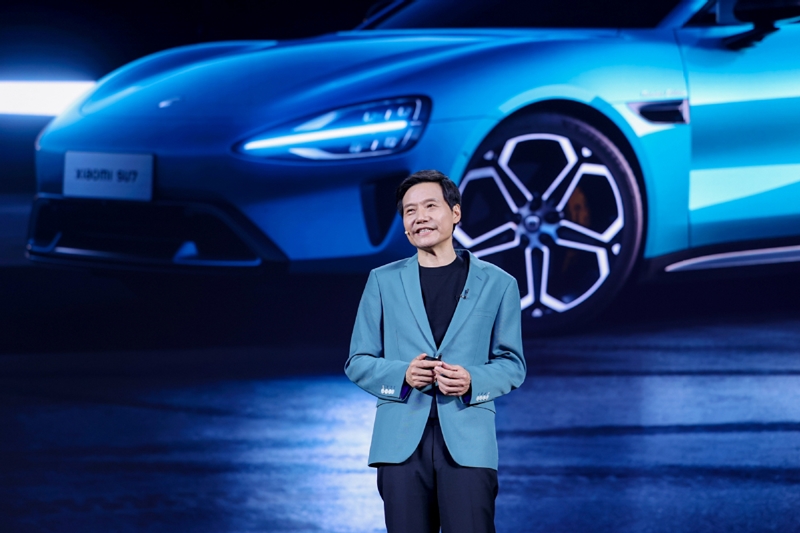chinadaily.com.cn
Updated: 2024-04-07

Lei Jun, founder and CEO of Xiaomi, unveils the company's first electric car in Beijing on Thursday. CHINA DAILY
The official launch of Xiaomi Corp's much-anticipated first electric vehicle will intensify competition in the crowded Chinese EV market and inject new vitality into the EV sedan segment, experts said on Friday.
Their remarks came after Lei Jun, founder and CEO of Xiaomi, on Thursday night reaffirmed its ambition to build cars comparable to those of global automakers Porsche and Tesla and to become one of the top five auto manufacturers in the world.
He announced that the price of its SU7 sedan models would range between 215,900 yuan ($29,874) and 299,900 yuan.
Roy Lu, a Shanghai-based automotive analyst, said Xiaomi's entry is expected to intensify competition in China's new energy vehicle market where established automakers, startups and tech companies are all vying to expand their presence.
A price war is already on in China's EV market, which is the world's largest.
Xiaomi's edge lies in its AI-enabled internet of things, or IoT ecosystem, which might give it an upper hand amid competition, Lu said.
That was fully on display at Xiaomi's launch event on Thursday night in Beijing where Lei not only explained the details of car design and automated driving functions, but also unveiled more than 100 IoT items that are useful to Xiaomi's car, such as tablets and refrigerators.
The Beijing-based company is hoping that the SU7's shared operating system with its phones, laptops and other devices will appeal to existing customers.
Lei said Xiaomi plans to invest 24 billion yuan in research and development this year, demonstrating a serious commitment to manufacturing cars.
The Xiaomi SU7 underwent comprehensive testing in 300 cities, covering a total road distance of 5.4 million kilometers, with 576 test vehicles deployed.
Lei said that over the past three years of manufacturing cars, his biggest realization was just how difficult it is, noting that even large companies like Apple Inc have given up on it.
According to him, consumers have already widely accepted electrification, and the key to winning the next stage of competition in EVs is to make cars as intelligent as possible, and that is Xiaomi's edge, as it has been devoting resources to AI R&D since 2016.
Shortly after the launch event, Xiaomi said it had received over 50,000 orders within the first 27 minutes.
Zhang Yongwei, vice-president and secretary-general of China EV 100, a major auto industry think tank, said the competition in the EV industry will heat up this year, with a more differentiated market landscape.
The next one or two years will be very crucial, Zhang said, as companies that may not have the necessary competence will likely exit the market after a shakeout.
"The production volume and sales of new energy vehicles in China are expected to reach 13 million units in 2024, with a year-on-year growth rate of about 40 percent," Zhang said.
Earlier this week, Chinese carmaker BYD announced its highest ever yearly profits but noted a deceleration in growth compared to the end of last year.
Nio, a Shanghai-based EV manufacturer, reduced its first-quarter delivery projections citing lackluster demand.
Experts said whether or not Xiaomi can really afford the capital and time needed for the cash-intensive smart car business remains to be seen, given that several Chinese companies that had entered the segment faced severe financial difficulties. Some of them have even gone bankrupt.
-
Address
Boda Building, No.15, Ronghua Middle Road, Beijing Economic-Technological Development Area
-
Email
investinbda@bda.gov.cn
-
TEL
+86-010-86409333(24h)
-
FAX
+86-010-67881207







